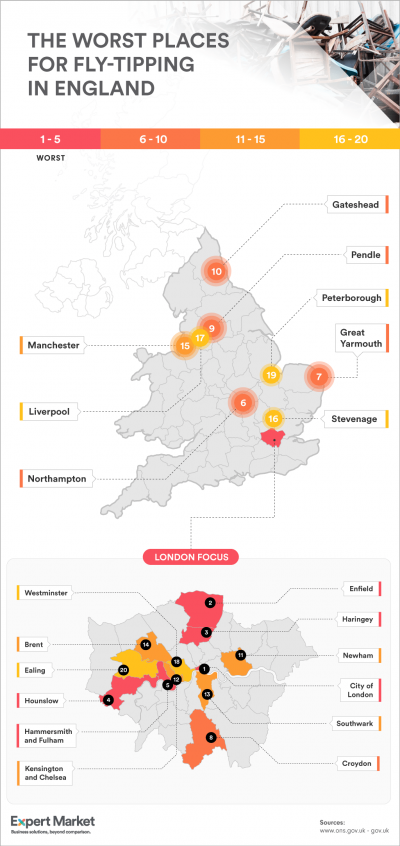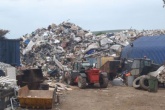Which local authority is England’s worst fly-tipping offender?
New research attempting to discover whether affluent areas are more likely to be affected by illegal rubbish dumping has found that The City of London is England’s worst fly-tipping offender.
Business solutions company Expert Market has created a heatmap that visualises the number of fly-tipping incidents per 1,000 people across over 300 local authorities in England and cross-referenced it with property prices, bringing to attention the rising problem of expensive neighbourhoods suffering from environmental vandalism caused by rogue rubbish dumpers.
The study finds that the Central London local authority – home to the Stock Exchange and where average property prices are just shy of £1 million – has the largest problem, with 238 fly-tipping incidents per 1,000 people.
As well as The City of London, the London Boroughs of Enfield (227), Haringey (122), Hounslow (85), Hammersmith & Fulham (81) and Croydon (64) all made it into the top ten worst zones for unlawful rubbish dumping, cementing London’s position as the worst city for fly-tipping in England.
Meanwhile, at the other end of the spectrum, Oadby and Wigston in the East Midlands was found to have the least incidents of fly-tipping, with 0.3 per 1,000 people. Other top performers include Kirklees (0.6), Suffolk Coastal (1.7) and Vale of White Horse (2.2).
Lucy Crossfield, who led the research, commented: "Most people living in London will be familiar with the problem of fly tipping, it is a sadly familiar sight on our streets. Despite paying premiums to live in these boroughs, many of us are used to stepping around debris dumped by unscrupulous traders or residents. There are so many ways to dispose of rubbish cheaply or entirely for free and this shows that more has to be done to make people aware of their options - and the consequences they face for not disposing of rubbish correctly."

"Sadly, many of these loads are dumped by unlicensed rubbish removal companies who claim to dispose of things responsibly but then drive to the next borough and dump it under the cover of darkness. The responsibility will now lie with the customer to check the credentials of the company they use, which will hopefully drive these rogue traders out of business and make our streets a lot cleaner."
Tackling waste crimes
Fly-tipping is a growing problem in England that is having a negative impact on the cleanliness of local neighbourhood, and this research comes shortly after the Department of the Environment, Farming and Rural Affairs' (Defra) called for homeowners and businesses to receive on-the-spot fines if their waste was disposed of by unlicensed removal companies. Previously, fines and penalties were only targeted at unauthorised waste disposal companies, but the government is now putting the responsibility on businesses and homeowners to help clean up the country's streets. Additionally, the maximum on-the-spot fine for littering and graffiti has almost doubled from £80 to £150, it was announced last month, with hopes that this will further deter people from littering.
Indeed, these are some of a number of significant actions that have recently been taken to combat waste crimes, which reportedly costs £604 million a year in losses to the waste industry and the taxpayer. The Environment Agency (EA) are also now able to block access when tackling fly-tipping and force operators to clear all their waste at problem waste sites, not just illegal ones, under new waste crime powers introduced in January.
Last year, the EA also announced plans to map England’s landscape in its entirety by 2020, which will be used to help combat waste crime. Using aircraft equipped with specialist laser scanners, the EA will map the country and use the data to tackle waste crime by spotting sudden environment changes that could indicate illegal dumping of waste.
The new research into fly-tipping can be read in its entirety on the Expert Market website.










